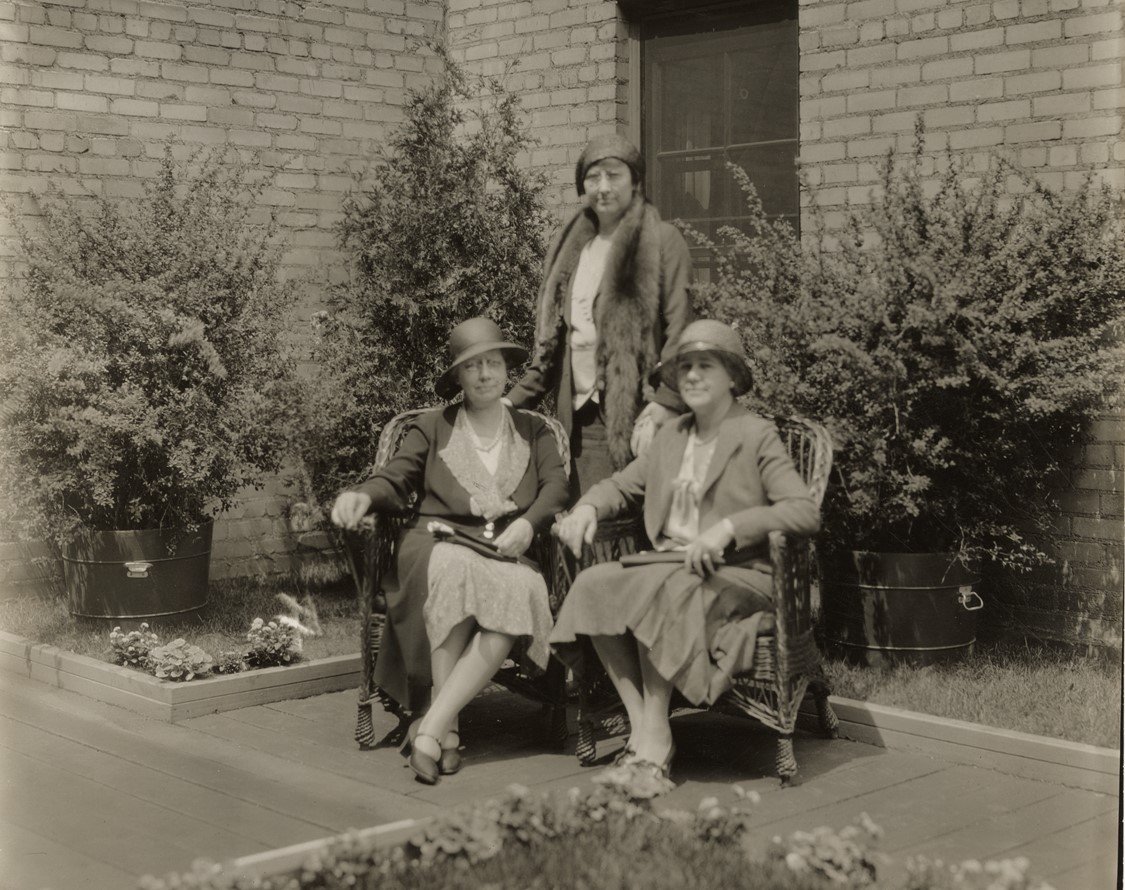Happy Saturday! Today: Advice and insights from our 100 Most Influential Women. Plus: a big vaccine mandate update, and a look at the history of women’s clubs in Detroit.
I always love your tips, feedback, and advice for tackling imposter syndrome: abragg@crain.com.
The big story: Influencing women

We can’t show you any of this year’s Most Influential Women winners yet, but we can share some of their advice.
On Monday, we reveal our list of 100 Most Influential Women in Michigan. We only give these awards once every five years, so these winners are in rarefied company.
This year, we asked our winners how the role of women in the workplace has changed over the course of their careers and to share their advice for other professional women.
We heard some common threads — and while I’m not at liberty to disclose any of these women’s identities yet, I’m sharing a few of their thoughts for you today as blind items. Come back on Monday to see the full list and read this story with attributions!
You belong at the table
It was personally heartening for me to learn that even the most powerful and accomplished women have struggled with the idea that they are not cut out for the job. Many winners said that it’s important for women in every season of their career to recognize and conquer that self-doubt.
“Read books on imposter syndrome,” one higher education executive advised. “I think it’s good for people to recognize imposter syndrome as a cultural phenomenon and not let it consume them.”
“Own your seat at the table, in leadership,” said one executive director. “In so many instances, we’re not accustomed to being there. Then, when we get there, we shrink. Get comfortable and know that you are there because you earned that seat.”
Looking past and forward
So many of this year’s Most Influential Women credited their own mothers, grandmothers and other women who came before them in laying the groundwork for their own success.
“History is an accelerator to me to reflect upon the past of my ancestors, informs who I am today and helps inform my future,” said one nonprofit executive.
When asked what has most influenced her career, one philanthropy leader — who also said she is her family’s unofficial genealogist and archivist — said, “I grew up in a single-parent household, (with) my mom and grandmother. I was surrounded by strong women. That has been the single biggest influence not just on my career but on everything I do and everything I am.”
“The challenge is for us to live up to the promise of the struggle that came before,” said one leader in manufacturing.
How things have changed — or not
Many women in traditionally male-dominated industries, including sports, banking, real estate and even (yep!) media, said there are more women in these sectors than there used to be — but that there is still plenty of room for improvement.
“Women today can achieve levels and compensation that were almost unheard of when I began my career,” said one woman executive at an energy company. “But women still make 15-25 cents an hour less than men, and Black women make 9 cents less than white women.”
Several women discussed the profound disruption of the coronavirus pandemic, which has pushed women out of the workplace in “devastating numbers,” as one business leader said. “We need to get them back,” another said. But some saw a silver lining — that the pandemic empowered women to ask for more.
“Women have taken the agency during this time period to really name what it is they need as far as accommodations,” said the leader of a major foundation. “To stand up and say, ‘If I’m going to multitask and be a mother and an employee and a leader and a wife and a community member, then I need some accommodations.’ I think those accommodations are going to become given and permanent as we move forward.”
There’s so much more food for thought and fuel for inspiration in this year’s list. Which influential woman climbed Mt. Kilimanjaro? Who sang in the choir at Rosa Parks’ funeral and how many (the answer is more than one!) drive race cars? Come find out on Monday.
Need to know: Shots clock

For most companies, the clock is now ticking toward a Jan. 4 deadline for all employees to be vaccinated against COVID-19 or subject to a weekly testing regimen, per federal rules announced this week.
January 4. $14,000 per violation. Those are the key details finally announced this week for Pres. Joe Biden’s vaccine mandate, first sketched out in September, which now has a deadline and some teeth. Workers at companies with 100 or more employees must be vaccinated against COVID-19 by Jan. 4 or get tested for the coronavirus weekly. The Occupational Safety and Health Administration said companies that fail to comply could face penalties of nearly $14,000 per violation. The rules will apply to about 84 million people, though we don’t know how many of those people have already been vaccinated. We have a handy FAQ here with answers to some of the more commonly asked questions among the zillions that these rules will prompt as the deadline swiftly approaches. In other huge vaccination news this week: COVID-19 vaccines are now approved for children ages 5-12. It felt like the early days of vaccine hunting again, with networks lighting up about whether to try CVS, Meijer, your local pediatrician’s office, someone else’s local pediatrician’s office, etc. to find the fastest shot.
Executives are quitting, too: Exhausted service and low-wage workers aren’t the only ones who are Greatly Resigning. Executives are also reevaluating their priorities and exploring their options. One local recruiting firm said that executive searches have doubled in 2021. Why are execs leaving? The refrains are familiar — more money, but also a readjusted relationship to work: “Most of my clients understand people need a 5 percent to 20 percent pay bump to change jobs, so that’s a given,” said the search firm’s CEO. “But what the executives also want is a hybrid work environment and the flexibility to work from home one day or five days a week.”
This week in Fernando: At a testy City Council committee meeting this week, five buildings on the Packard Plant site were approved for demolition. Fernando Palazuelo, the Packard Plant’s petulant Peruvian owner, objected to the decision, saying that he has spent $5 million cleaning up the massive long-vacant site and declaring that the committee was “breaking the spirit of the democratic hearing,” in my favorite quote of the week. “Don’t go there,” responded Councilman Roy McCalister, in my second-favorite quote of the week. In better buildings news, we also saw some new plans this week for Stanley’s Mannia Cafe, whose new owner is seeking approval to convert the historic Googie-style building into a music and performing arts venue.
Historical footnote: Find me at the club

Three women posing in the courtyard of the Women’s City Club of Detroit building. Original photo here.
Last week, Crain’s Executive Editor Kelley Root wrote about the launch of BasBlue, a new nonprofit gathering place for women and nonbinary individuals in Detroit’s East Ferry Street Historic District. The club, founded by Nancy Tellem and Natacha Hildebrand, aims to create a diverse, authentic community — and a space to recharge, network and connect with other women, from seasoned executives to those just starting their careers.
Women’s clubs in Detroit have a rich history. A century ago, “club women” in Detroit wielded outsized power and influence (in a city known for its many social clubs, for men and women). On Most Influential Women eve, it felt appropriate to get to know just a few of them:
Twentieth Century Club: Founded in 1894 and committed to “social progress,” the Twentieth Century Club’s activities were as varied as anti-smoking campaigns, efforts to improve public health and sanitation and advocacy toward housing reform, education, and urban agriculture. Mary McCoy, Detroit’s most famous Black clubwoman, was among its charter members (who were otherwise white). Their clubhouse, built in 1903 and designed by architect George Mason, was the first building in Detroit whose construction was financed entirely by women. Today we know it as the Gem Theatre and Century Club; it was laboriously rolled over to its current location at Madison and Brush streets during the construction of Comerica Park.
Detroit Association of Colored Women’s Clubs: Just down the street from where BasBlue is today is the Detroit Association of Colored Women’s Clubs, organized in 1921 as an alliance of eight Detroit Black women’s clubs. In 1941, the Association purchased a home on Ferry Street to serve as its headquarters. But a restrictive property covenant was in place at the time to prevent Black people from owning property on the block. The determined Association president Dr. Rosa Gragg found a work-around: she bricked off the door on Ferry Street and built a new door on Brush Street instead, outside of the boundaries of the covenant. You can still see the bricked-off Ferry Street front door.
Women’s City Club: The Women’s City Club was founded in 1919 to promote “a broad acquaintance among women.” It grew to be one of the largest women’s clubs in the world, with over 8,000 members. The clubhouse it built is a downtown landmark, designed in 1924 by architect William P. Stratton. His wife, Mary Chase Perry Stratton, the co-founder of Pewabic Pottery, served as club chairwoman, and her Pewabic tiles decorate the building.
Many women’s clubs were leaders on the cause of women’s suffrage — which, as a footnote to the footnote, prevailed in Michigan on Nov. 5, 1918, after several previous failed efforts at the ballot box.
Most-read stories: Oct. 30-Nov. 5
2. Popular Filipino chain Jollibee to open first Michigan location
3. ‘The Great Resignation’ hits the executive ranks, too
4. Whitmer calls for catastrophic injury fund to issue $5 billion in refunds to Michigan motorists
5. After 63 years, Frank’s Shoe Service in Birmingham to close to make way for RH project
6. Real Estate Insider: California ‘Dormzilla’ had test bed at UM
7. State giving up after Port Huron fights COVID-19 case
8. Local estate planning attorney pleads guilty to embezzling tens of thousands from trust
9. Michigan is beating Illinois at the cannabis game
10. Adding ‘firepower’: Level One Bank to be acquired in $323.5 million deal
